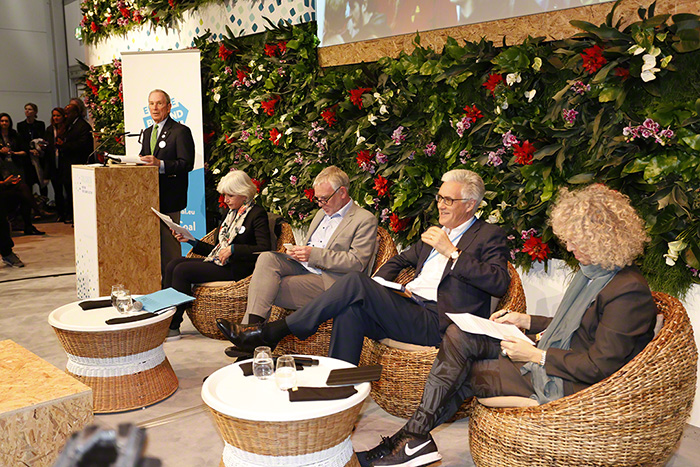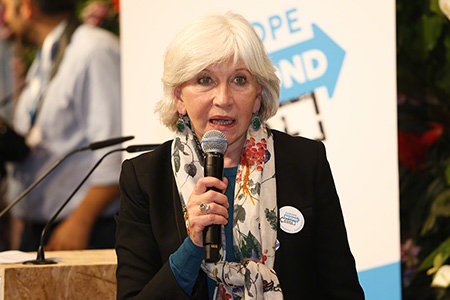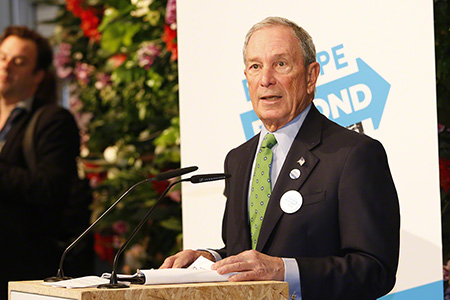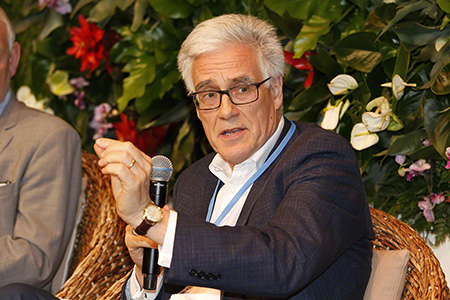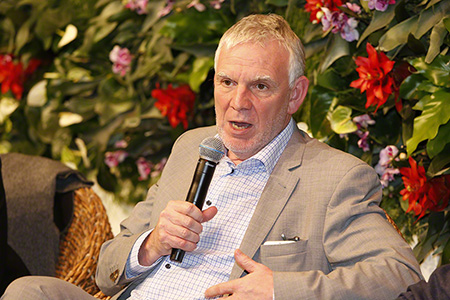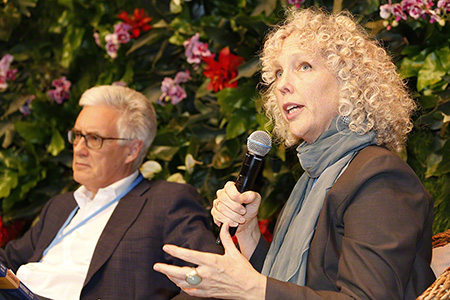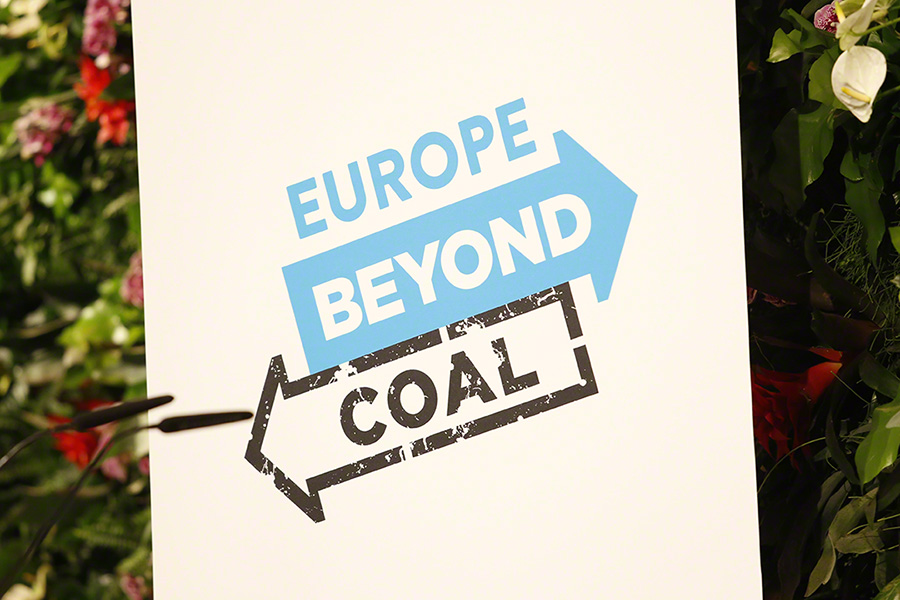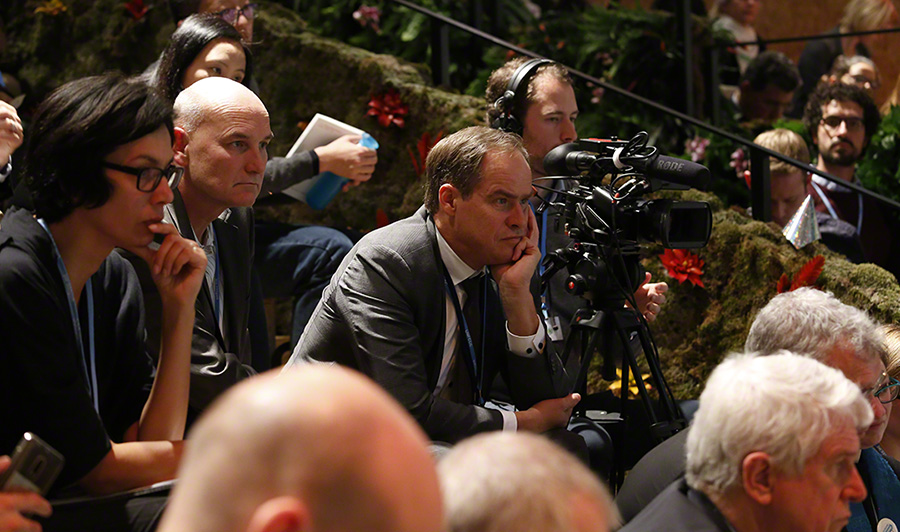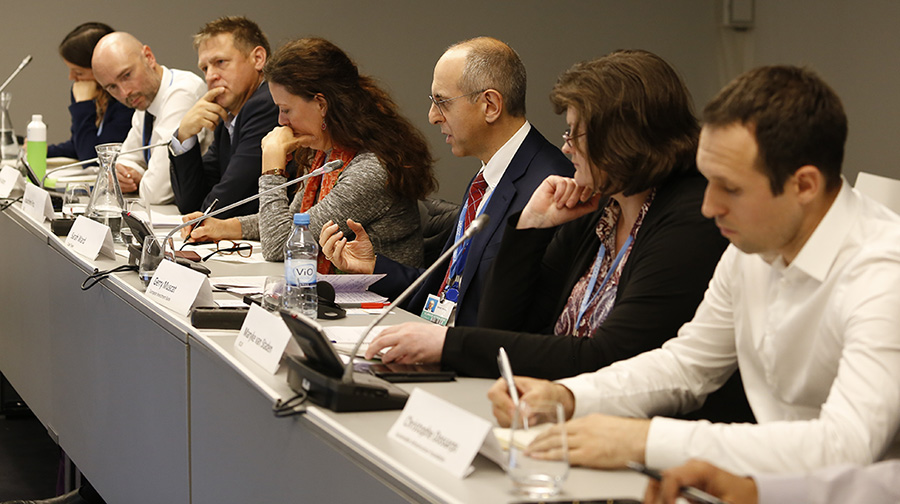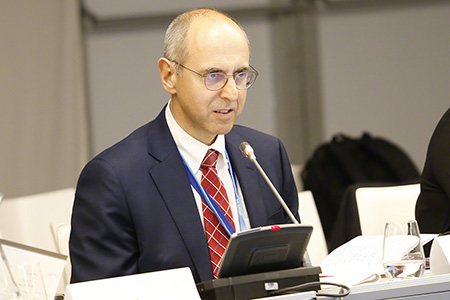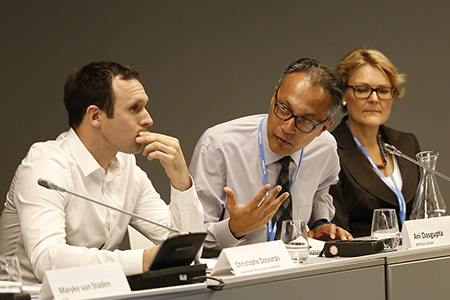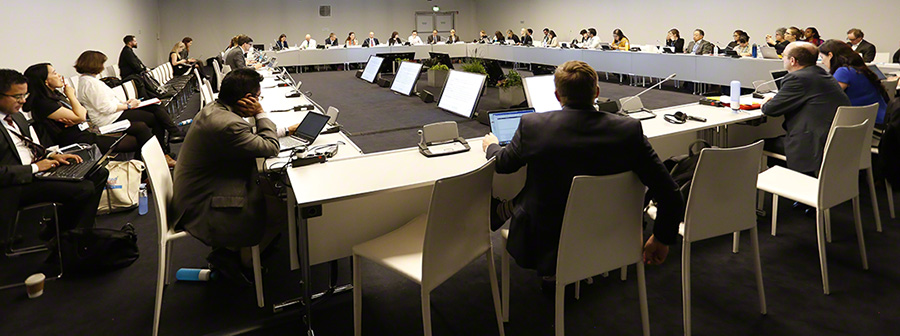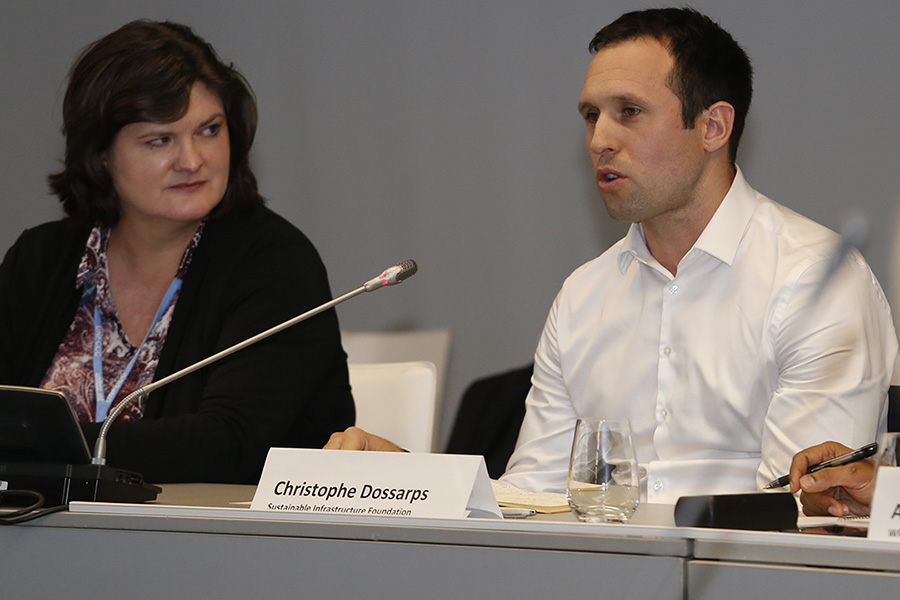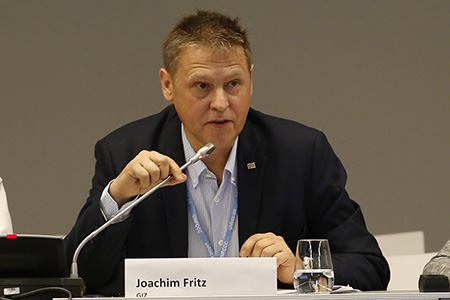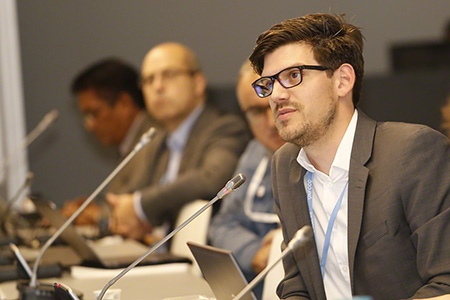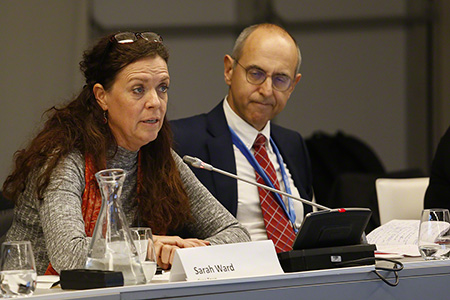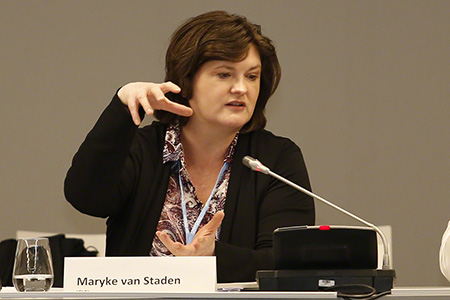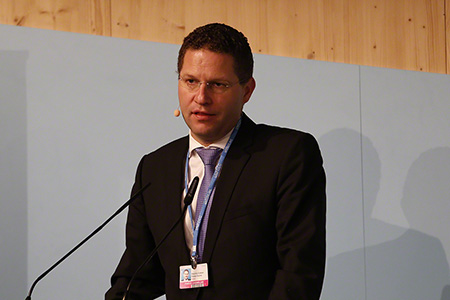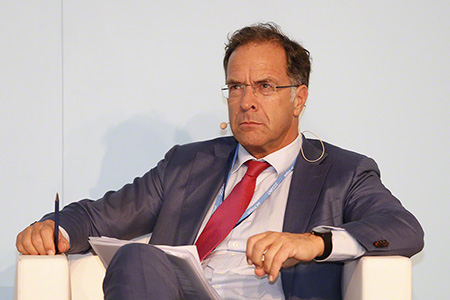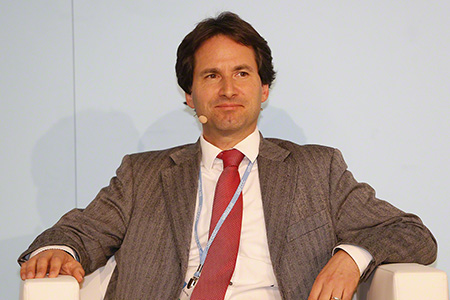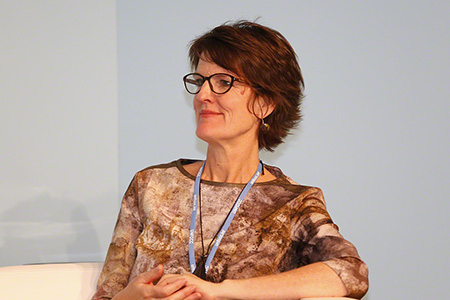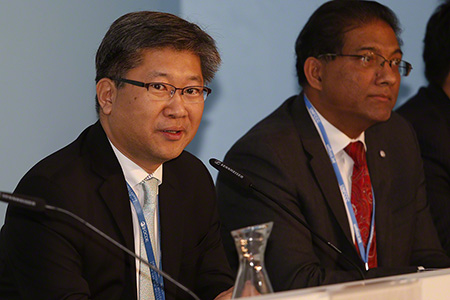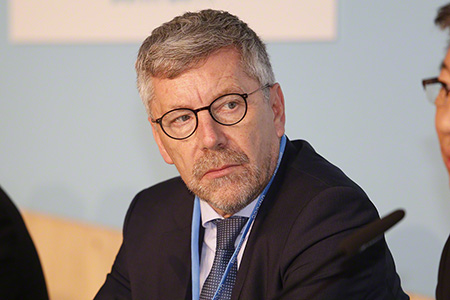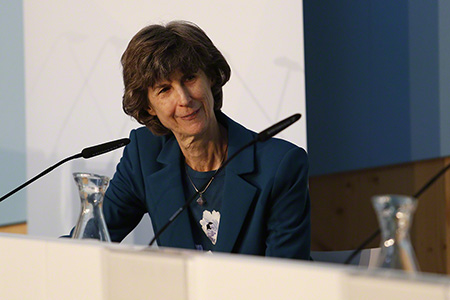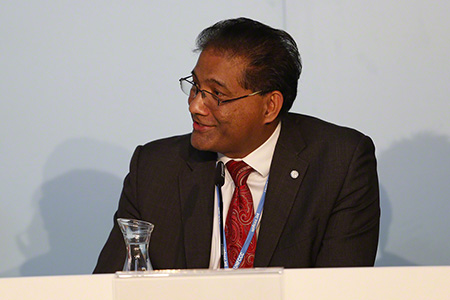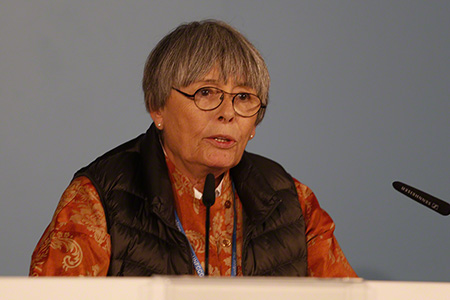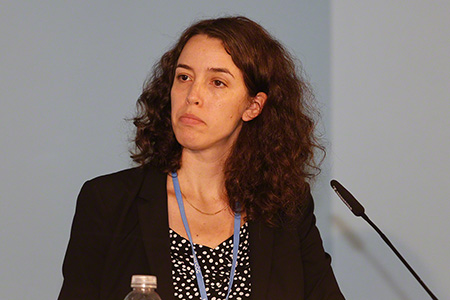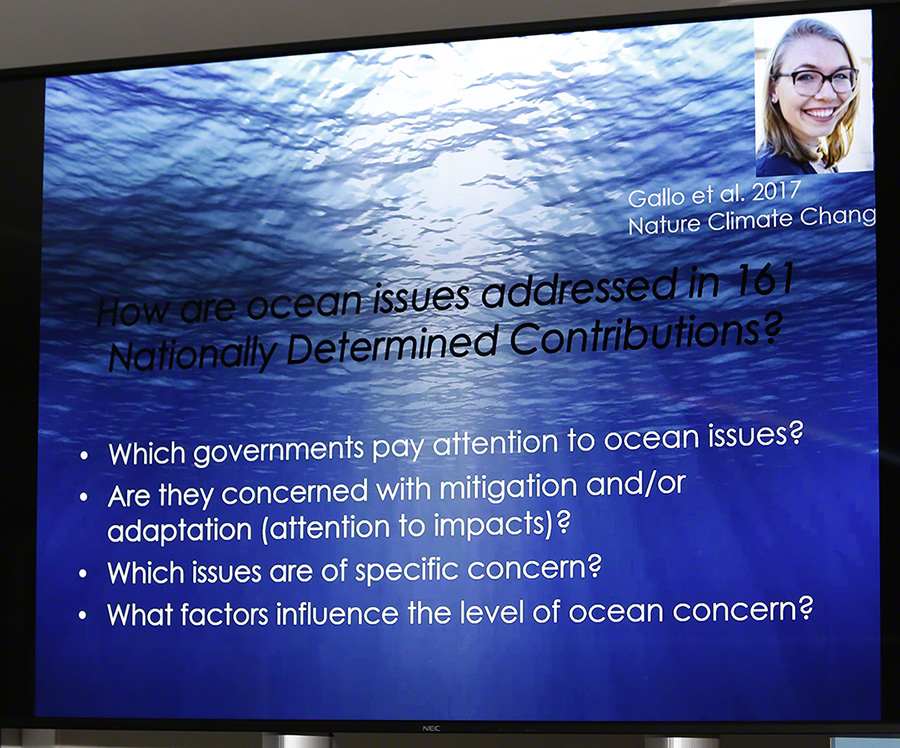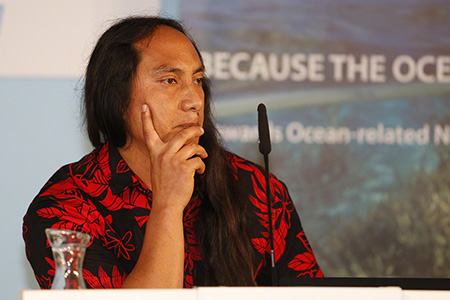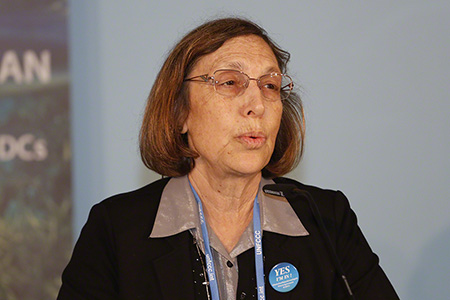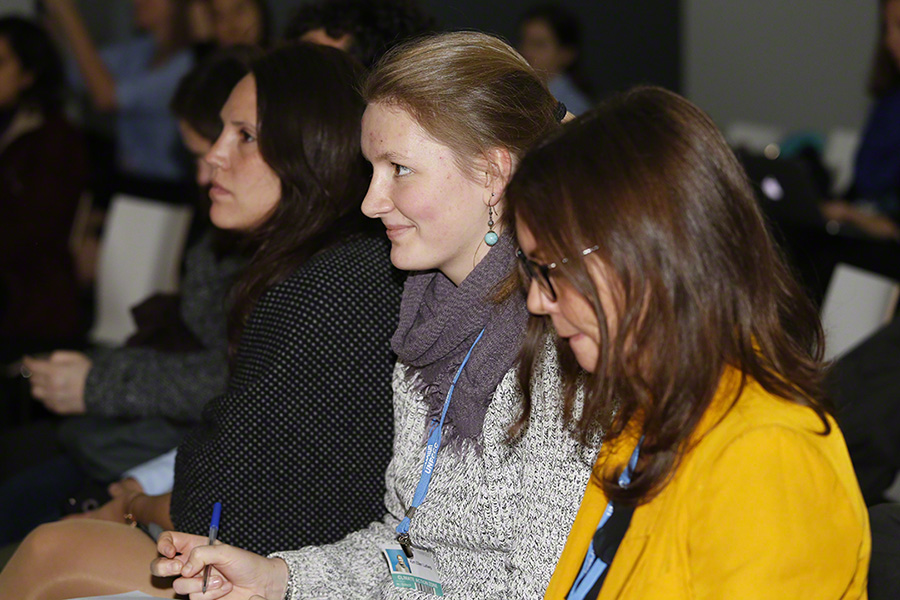Summary

The following events were covered by IISD Reporting Services on Saturday, 11 November 2017:
- Moving Beyond Coal after Paris: Can the US and the EU Retire Their Coal Plants in Time to Deliver on Paris Targets?
- Accelerating the Urban Transformation: Financing and Implementing Infrastructure Projects in Cities and Regions
- Shifting Personal Mobility through Innovations in Transport Technologies, Systems and Planning
- Sustainable Mobility in a Changing Climate
- Because the Ocean Matters
IISD Reporting Services, through its Earth Negotiations Bulletin on the Side (ENBOTS) Meeting Coverage, will provide daily web coverage from selected side events at the UN Climate Change Conference - November 2017.
Photos by IISD/ENB | Ángeles Estrada and Herman Njoroge Chege
For photo reprint permissions, please follow instructions at our Attribution Regulations for Meeting Photo Usage Page.
Moving Beyond Coal after Paris: Can the US and the EU Retire Their Coal Plants in Time to Deliver on Paris Targets?Presented by the European Climate Foundation (ECF)
This event, moderated by Laurence Tubiana, CEO, ECF, discussed opportunities for, and challenges to, moving global economies away from coal. Panelists emphasized the need to mobilize civil society and discussed cases in Germany and the UK, noting that coal is a global issue. Panelists also recalled the impacts of climate change on the most vulnerable populations and called for a fair coal transition to improve human and environmental health.
Michael Bloomberg, Bloomberg Philanthropies, emphasized that coal remains one of the leading causes of death and disease worldwide, and noted that 800,000 people, three times that of Bonn’s population, die from its effects every year. He focused on good policy examples to reduce coal use, and announced positive advancements resulting from market forces, and from companies, communities, cities and states that want to save money and protect their health. He stressed that these forces are shaping a carbon-free world.
Adair Turner, Chairman, Institute for New Economic Thinking (INET), said that although people are increasingly aware of coal’s negative impacts on the environment, faster action is necessary, if the Paris Agreement’s targets are to be taken seriously. He emphasized the importance of convincing major developing economies that coal is a fuel “from the past” and that it is economically advantageous to move away from it.
Jochen Flasbarth, State Secretary, German Federal Ministry of the Environment, Nature Conservation, Building and Nuclear Safety (BMUB), recalled Germany’s progress on renewable energy, declaring that the “commitment is there.” He affirmed that carbon neutrality is possible and that this can be achieved in the next two decades. Flasbarth concluded by praising the German society for making the decision to move away from coal.
Jennifer Morgan, Executive Director, Greenpeace International, in explaining her organization’s strong stance acting against coal, noted its devastating effects on human health. She underscored the need for more advocacy campaigns and declared that the transition away from coal must be “managed,” referring to the need to ensure job creation in this coal-free economy. She concluded by urging civil society to mobilize in order to make this “revolution” relevant for citizens.
In the ensuing debate, participants stressed, among other things: the importance of long-term plans; the role of civil society engaging in the transition away from coal; the EU as a leader in addressing climate change, in the context of rising social conflicts in the region; tools for decarbonization; and nuclear energy.
L-R: Michael Bloomberg, Bloomberg Philanthropies, Laurence Tubiana, CEO, ECF; Jochen Flasbarth, German State Secretary, BMUB; Adair Turner, Chairman, INET; and Jennifer Morgan, Executive Director, Greenpeace International
Laurence Tubiana, CEO, ECF, said that “we are mobilized to move away from coal, that’s why we are at COP 23.”
Michael Bloomberg, Bloomberg Philanthropies, declared “the truth of the matter is we are leading the way despite our federal government.”
Adair Turner, Chairman, INET, explained that the clean energy transition is about “simple math” and political commitment.
Jochen Flasbarth, German State Secretary, BMUB, said “we have to do it in the right away,” noting changing perceptions with respect to the urgency of moving away from coal.
Jennifer Morgan, Executive Director, Greenpeace International, declared: “facts are clear, it’s the power dynamics that hold us back.”
Contact:
- Katrin Riegger (European Climate Foundation) | katrin.riegger@europeanclimate.org
More Information:
Accelerating the Urban Transformation: Financing and Implementing Infrastructure Projects in Cities and Regions Presented by the C40 Cities Finance Facility
In this session, panelists discussed the needs of cities, project developers and financiers in the preparation of bankable and sustainable city development projects to reduce carbon emissions and build climate resilience. Moderator Ani Dasgupta, Global Director, World Resources Institute (WRI) Ross Center for Sustainable Cities, said this is a challenging task that requires ambitious approaches, a range of partnerships and effective project preparation support to deliver sustainable infrastructure.
Vera Rodenhoff, BMUB, noted that, as the biggest carbon emitters with ever-increasing populations, cities need to attract greater attention since sustainable infrastructure can enable or disable the needed transformation to achieve the Paris Agreement’s goals. She emphasized the need for stakeholders to talk to one another and at all levels, and complement one another.
Mark Watts, Executive Director, C40 Cities Climate Leadership Group (C40), suggested that the trend of decentralizing climate governance does not yet include climate finance, and there is a gap in understanding this topic, particularly in the Global South. He noted C40’s objective of trying to capture and share the knowledge coming out of a small number of cities. Watts said that this would ensure a quick adoption of lessons learned and getting city project approval, and added that through his organization, cities receive crucial assistance in project preparation.
Gerry Muscat, European Investment Bank (EIB), identified the main challenges in accelerating climate finance availability, including: the lack of financially sustainable and mature projects submitted; the lack of technical assistance and support available to bring these projects to maturity; and the credit-worthiness of many local governments.
Joachim Fritz, German Development Agency (GIZ), recalled many years of infrastructure development experience without “getting the finance right” in the local infrastructure development space. He attributed this to a lack of properly prepared and planned projects, mainly due to capacity shortage and inappropriate utilization of technical expertise.
Sarah Ward, Head of Cape Town Energy and Climate Change, describing experiences in her city with green bonds financing and refinancing many projects, warned that investing in adaptation projects will not necessarily “make a city greener.” She elaborated on challenges in South African cities, saying the government has abandoned the renewable energy trajectory for more lucrative nuclear power development deals.
Maryke van Staden, Director of Bonn Centre for Local Climate Action and Reporting (carbonn Center), emphasized the importance of project preparation support and in developing greenhouse gas (GHG) inventories. She noted the benefits of local city networks such as ICLEI - Local Governments for Sustainability and C40 in taking good concepts and developing them into strong investable projects.
Christophe Dossarps, CEO, Sustainable Infrastructure Foundation (SIF), cautioned against simply increasing project preparation facilities without improving the quality of the data and other aspects. He urged developing a standard for infrastructure project preparation, without which the security of the investment is at risk.
Tania Rödiger-Vorwerk, German Federal Ministry of Economic Cooperation and Development (BMZ), closed the session and highlighted key aspects of finance, including to: continue financiers’ support to cities for capacity building; enhance project linkages; and reduce financial risks, such as fiscal governance and the borrowing power of cities.
L-R: Vera Rödenhoff, BMUB; Mark Watts, Executive Director, C40; Joachim Fritz, GIZ; Sarah Ward, Head of Cape Town Energy and Climate Change; Gerry Muscat, EIB; Maryke van Staden, carbonn Center; and Christophe Dossarps, CEO, SIF
Gerry Muscat, EIB, urged panelists to “find the key that will unlock” the door between national and local fiscal relations.
L-R: Moderator Ani Dasgupta, Global Director, WRI Ross Center for Sustainable Cities
Christophe Dossarps, CEO, SIF, said cities and regions need to use the same language when communicating with national governments.
Joachim Fritz, GIZ, noted that the local city network is “hitting the nail on the head” with improving project preparation facilities.
James Alexander, Head of the C40 Cities Finance Facility, said mayors do not just want a reduction in emissions, but they also want to increase jobs and improve livelihoods.
Sarah Ward, Head of Cape Town Energy and Climate Change, suggested the city’s obsession with clean audits has compromised the ability to get innovative projects “off the ground.”
Maryke van Staden, carbonn Center, stressed the need to “connect the dots” with all actors involved when developing infrastructure development projects.
Contact:
- Aris Moro (C40 Cities Finance Facility) | amoro@c40cff.org
More Information:
Shifting Personal Mobility through Innovations in Transport Technologies, Systems and PlanningPresented by the International Association of Public Transport (UITP)
In this side event, panelists explored shifting personal mobility, with a particular geographic focus on urban areas and examples from both the Global North and South. Clayton Lane, CEO, Institute for Transportation and Development Policy (ITDP), moderated the session. In his introduction, he called for an integrated approach to the transport transformation, focusing on automation, electrification and shared mobility, emphasizing the value of compact city planning.
Bronwen Thornton, Walk21, underscored the important role that walking plays in transport and in the climate agenda. Regarding urban planning, she explained that density, connectivity and destinations will result in walking by default. Noting that the transport sector has been slow to adopt walking, she said that walkability around transit stations increases ridership. She concluded that people on foot are the indicator for quality of life in cities, and urged to put walking at the forefront to solutions.
Pierre Serne, MobiliseYourCity (MYC) partnership, highlighted the work of his organization, which was created to assist in the planning of sustainable urban mobility in cities in the Global South. He said their mission was based on the belief that investing in Southern cities was more valuable than investing in Northern ones, as population growth and urban transportation are larger and have more climatic impacts in the former. He added that small investments in planning have rapid and substantial effects on reducing climatic impacts.
Mauricio Rodas, Mayor of Quito, recalled the UN Conference on Housing and Sustainable Development (Habitat III), which his city hosted in 2016. He explained that Quito has an integrated mobility scheme, which includes: a metro that moves 400,000 people per day; a cable car to reach mountain villages; and expanded bike lanes including electric bikes. He added that his city, along with 11 others, has signed a pledge to buy zero emissions buses by 2025. He called to incorporate transit transformations into Nationally Determined Contributions (NDCs).
Pex Langenberg, Vice Mayor of Rotterdam, stated that his city is committed to working with the Paris Agreement towards becoming a resilient city. He explained that Rotterdam is working towards zero emissions transport, focusing on e-mobility (with 2000 charging points in the city), which also provides a healthy environment through improved air quality. He highlighted Rotterdam’s holistic approach to sustainability, noting specifically a bike-friendly environment, electric and hydrogen transit, and an attractive city environment.
Gunnar Heipp, Munich Transport Corporation (MVG), noted the progress transport has made in gaining traction at climate summits. He referred to the UITP’s Declaration on Climate Leadership, launched prior to COP 21, aiming to reduce emissions from the public transit sector, which received 300 pledges from 110 members worldwide. He called for walkable cities and urged participants to seek existing information particularly through UITP.
During the ensuing discussion, participants addressed, inter alia: ways to catalyze finance for public transportation; interventions that can take place at the different stages of development; cycling policy in Quito; and waste from energy transport.
In closing, Lane emphasized three outstanding conclusions from the session: the importance of local action in transforming transport in cities; the need for holistic and integrated approaches; and the value of replicable and scalable solutions.
Pex Langenberg, Vice Mayor of Rotterdam, explained that “the only way to move people from car use to bikes, is to make the car more expensive.”
L–R: Clayton Lane, CEO, ITDP; Gunnar Heipp, MVG; Pierre Serne, MYC; Pex Langenberg, Vice Mayor of Rotterdam; and Bronwen Thornton, Walk21
Mauricio Rodas, Mayor of Quito, said that Quito’s transport system is responsible for 56% of the city’s emissions.
Pex Langenberg, Vice Mayor of Rotterdam, explained that “the only way to move people from car use to bike, is to make the car more expensive.”
Gunnar Heipp, MVG, said that citizens should pay for the waste they use, which will motivate them to champion for policy change.
Bronwen Thornton, Walk21, recommended to avoid moving walkers to public transit, but instead “reward them by improving the facilities they use.”
Contact:
-
Philip Turner (UITP) | philip.turner@uitp.org
More Information:
Sustainable Mobility in a Changing ClimatePresented by the World Bank, the UN Department of Economic and Social Affairs (UN DESA) and the Sustainable Mobility for All (Sum4All) Initiative
Moderated by Laura Tuck, World Bank, this event discussed mobility as a central element to transform global economies and help the most vulnerable live in a more sustainable world considering that the transport sector contributes 23% of GHG emissions.
In the opening remarks, Nancy Vandycke, World Bank, presented key findings of the Global Mobility Report 2017. She stressed how mobility is under pressure in a changing world, where pollution takes a toll on citizens’ health, and highlighted fragmentation in the transport sector and the need to avoid duplication of work. Saying that “the transport we have today is not the one we want,” she called for more united advocacy, action and financing to make “sustainable mobility for all” a reality. She also emphasized the need to reposition the sector as a solution for regional integration and sustainability, health improvement and Sustainable Development Goal (SDG) synergies. She announced efforts to develop a global roadmap of actions, private financiers and a list of country champions.
Through a video message, Jean Todt, UN Special Envoy for Road Safety, said that transportation is a key avenue to move implementation of the Paris Agreement forward.
Inia Seruiratu, Minister for Agriculture, Rural and Maritime Development and National Disaster Management and Meteorological Services, Fiji, called for equitable, safe and greener mobility, while praising the Sum4All initiative. He stressed the need for factual evidence to convince decision makers to act on transport to go “further, faster, together” adding that small island developing states (SIDS) are highly dependent on more efficient modes of transportation. He said technology must be scalable and linked to technical examinations, and that designing new transport policies presents economic opportunities.
Young Tae Kim, Secretary-General, International Transport Forum (ITF), emphasized the need for transportation to be inclusive, socially oriented, technically driven, cleaner, safer and security oriented. Speaking about ITF’s work, he declared that his organization is the only one to cover almost all types of transportation, noting the need to avoid duplication of work. He emphasized institutional challenges in decision making on transportation, lamenting that “in reality” coordination remains problematic due to conflicts of interest between central and local governments.
Christian Labrot, President, International Road Transport Union (IRU), said the report provided a key opportunity to conduct cooperative work with all transport stakeholders. Noting that the transport sector is at a crossroads given the need to act on climate change, he said that new technologies can help the sector to meet its new target of a 30% reduction in GHG emissions by 2030. On challenges, he indicated the need to recognize the role of commercial vehicles as polluters, especially in a globalized economy. He highlighted the importance of training for transport operators on new safety standards and more efficient fuel use practices.
Tetsuya Tanaka, International Civil Aviation Organization (ICAO), congratulated the four Global Mobility Report goals of safe, accessible, clean and secure transport, and said that while safety cannot be compromised to cut emissions, ICAO members have agreed on a carbon off-setting scheme from 2020 onwards.
Jose Matheickal, International Maritime Organization (IMO), provided his views on the Global Mobility Report, and considered the “right approach to track progress” on the transport sector. He said that some areas might need more data, noting that shipping is not an easy area for data collection. He noted successful public-private partnerships within the maritime sector and said that new global roadmaps can ensure better synergies among key stakeholders.
In the ensuing debate, panelists raised challenges related to: the need to balance economic growth with cleaner transportation; clean technologies; the relationship between climate change and sustainable mobility; lack of cooperation among air, maritime and road transportation; and weak implementation of global targets at the national level.
L-R: Laura Tuck, World Bank; Inia Seruiratu, Minister for Agriculture, Rural and Maritime Development and National Disaster Management and Meteorological Services, Fiji; Christian Labrot, President, IRU; Young Tae Kim, Secretary General, ITF; Jose Matheickal, IMO; and Tetsuya Tanaka, ICAO
Young Tae Kim, Secretary General, ITF, asked whether “we can really apply one solution to all countries,” suggesting that behavior change is also needed to achieve eco-friendly mobility.
Christian Labrot, President, IRU, declared mobility is an issue of freedom, above all.
Laura Tuck, World Bank, noted financial constraints to decarbonize transportation around the world in a united manner.
Jose Matheickal, IMO, recalled the specificities of the maritime sector when curbing emissions.
Contact:
- Nancy Vandycke (World Bank) | nvandycke@worldbank.org
More Information:
Because the Ocean MattersPresented by the Scripps Institution of Oceanography at the University of California San Diego (UCSD) and the Ministry of Foreign Affairs of Chile
In this side event, panelists explored the importance of oceans, highlighting three components: the scientific background; mobilization of non-state actors to protect the oceans; and the implementation of ocean-related climate change actions. Eduardo Silva Besa, Ministry of Foreign Affairs, Chile, moderated the session.
Lisa Levin, Scripps Institution of Oceanography, UCSD, emphasized that carbon emissions are changing the climate on land, but that the ocean is probably the planet’s greatest mitigator. She added that one quarter of excess CO2 is absorbed by oceans and this has had a negative impact on ecosystems. Levin highlighted findings from her research, which examined how oceans are incorporated into NDCs, explaining that 70% of all NDCs mention them, including all but one SIDS. She called for establishing climate conferences to educate children around the world about the importance of oceans.
Françoise Gaill, Tara Expeditions, presented the work of her organization, in which researchers travel the ocean by ship to understand phytoplankton, which, she said, was “the world’s most important ecosystem.” She noted that collaboration with many institutions sequenced more than 40 billion genes, with coverage in 2000 press articles in more than 140 countries. She highlighted the Ocean and Climate Platform was established based on these efforts.
Julie Horowitz, Office of Washington Governor Jay Inslee, explained that the West Coast States in US and British Columbia in Canada established the International Alliance to Combat Ocean Acidification, which includes a coalition of governments and affiliate members. She said that they created a toolkit with examples of how to advance each of their overarching strategies. She also noted Washington’s Blue Ribbon Panel on Ocean Acidification, a comprehensive state level effort with 42 recommendations.
Semisi Meo, Conservation International (CI), noted three new pieces of legislation that have been adopted in his country, Fiji, to protect marine areas. He said that civil society organizations, not the state, have established marine protected areas around his country, which includes species management and has been up-scaled into government policy. He added that his organization has successfully led community-based adaptive management on oceanic areas.
Enrique Icka, Toki, Rapa Nui, Easter Island, highlighted his country’s connection to the ocean, pointing to its population of 9,000, pointed to polluted underground water reservoirs and said 9500 liters of diesel is consumed daily. He drew attention to Toki, a sustainable earth music school founded to connect young generations on the island with their heritage and culture, saying that art is the vehicle for change and the expression of the soul. He concluded that he envisioned his country as a center of sustainability and inspiration, as they have a climate change adaptation plan, a waste management plan known as EcoKuhane, strategic alliances and a sustainability center.
During the ensuing discussion, participants addressed coral bleaching and how to empower youth to address climate change.
Françoise Gaill, Tara Expeditions, said her organization conducted public outreach and education based on its research.
Julie Horowitz, Office of Washington Governor Jay Inslee, said that “we cannot wait to tackle hard problems, and we need to build the political support to make needed changes.
Enrique Icka, Toki, Rapa Nui, said “we need to connect again to the earth.”
Lisa Levin, Scripps Institution of Oceanography, UCSD, stated that 93% of the excess heat caused by climate change has been absorbed by the ocean.
Contact:
-
Eduardo Silva Besa (Ministry of Foreign Affairs, Chile) | esilvab@minrel.gob.cl
More Information:
Around the Venue
